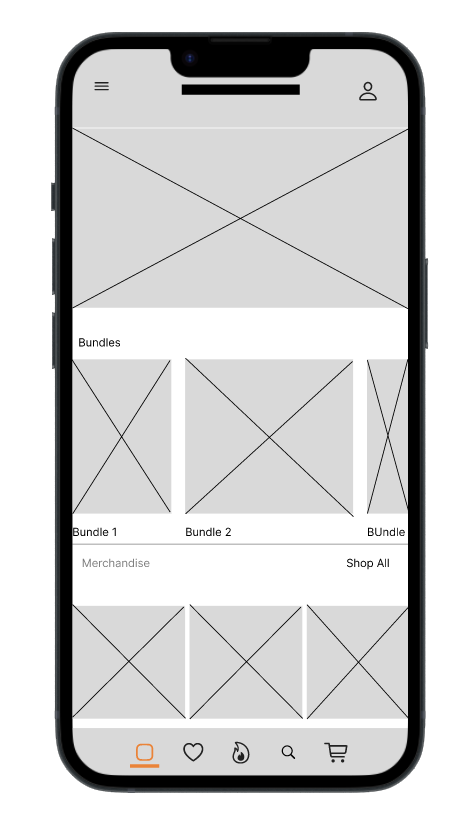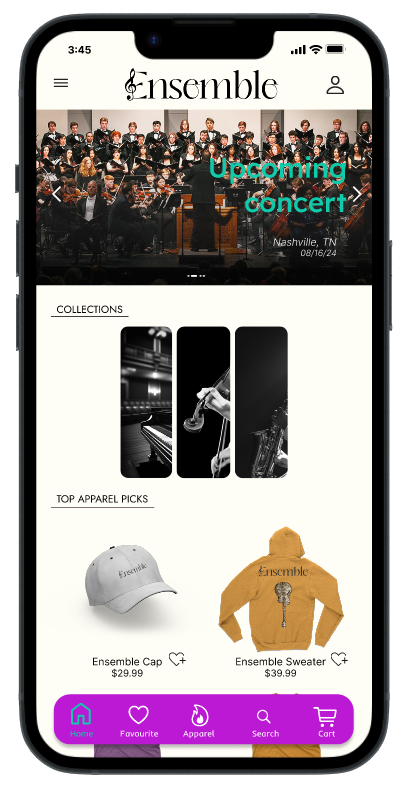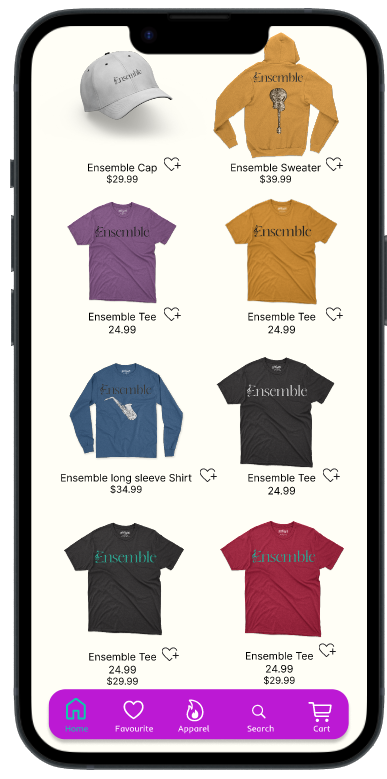top of page
Ensemble merchandise
Project type: End-to-end app + branding
Role: UX/UI designer + brand designer
Industry: E-commerce, music
Merchandising application for an Orchestra
(first google certificate design project)

Introduction
Project overview
I designed the Ensemble app to satisfy the prompt “Design a merchandise app for an orchestra.”
The app targets the quality-time conscious user and provides them a way to:
Skip the lines and inconveniences of the gift shop
Focus on the experiences of the concert hall
Have their merchandise delivered to them at home
The problem:
Orchestra patrons have very limited time during intermission or after a concert, and they prefer to spend it getting drinks, socializing, and discussing the show, rather than standing in line.
The goal:
Design an app that allows users to:
Shop for merchandise from their seat or later at home
Have their items shipped to their residence
My role:
Sole UX designer covering all aspects of the project from conception to delivery.
Responsibilities:
Interviews
User stories and personas
Paper and digital wireframes
Low and high-fidelity prototypes
Usability studies
Iterating on designs
Accounting for accessibility
Understanding the User
User research: Summary
This group confirmed the hypothesis that users want
a way to shop from their seats.
This research also revealed other factors limiting their purchase of merchandise:
The time cost of gift shopping over concessions or socializing
The annoyance of carrying purchases for the remainder of the event
The overwhelming nature of traditional gift shops
I conducted interviews and created empathy maps to better understand potential users and their pain points.
I identified a primary user group of professionals between 35–44 years of age with a strong interest in unique, experience-based merchandise.
However, they don’t like spending time and energy on shopping and carrying merchandise during a concert.
User research: Pain points
1
2
3
4
Time cost
Time is valuable during a concert experience. Users want to budget as little time as possible for shopping and waiting in lines.
Item transport
Purchased items must be carried around and remembered the rest of the evening.
Choice overload
Traditional gift shops and merchandise tables overwhelm the user with choices that aren’t relevant to them.
Info availability
It’s difficult to get answers to questions such as materials used, quality, and stock. It’s also hard to trust answers from a shop employee, lowering purchase confidence
Wireframes / Low fidelity protoype
Wire frames

Low-fidelity prototype

For mock up I enhanced features from the wire frames and delved deeper into animation, creating an animated like button for users to add items to their favorites. the ‘Bundles’ section was also renamed to ‘Collections’ to emulate special deals from fictional concerts.
Wireframe

Mock up homescreen

Homepage scrolled

High Fidelity Prototype
High-fidelity prototype The final prototype streamlines the navigation, directs users to the primary flow by reducing noise, and highlights the app’s most desirable features
Mock up
1
Used icons for easier navigation and comprehension across language and ability
Accessibility considerations
2
Adjusted button and font sizes as well as contrast levels to meet accessibility standards
Key takeaways
Impact:
With consumers focusing more on maximizing experiences, the app allows them to enjoy more time taking in what the concert hall and its patrons have to offer, while still finding a memento to commemorate their experience.
What I learned:
Designing the Ensemble app reinforced the value in setting aside assumptions and biases to empathize with users and iterate on their feedback. The design was improved every time I went back to users.
Next steps
Conduct more user research to start developing secondary flows and further features for the app.
Iterate on and test ideas for external triggers to direct orchestra patrons to download and use the app before, during, and after their experience
Thank you for your interest in my work. Let’s connect!
bottom of page
